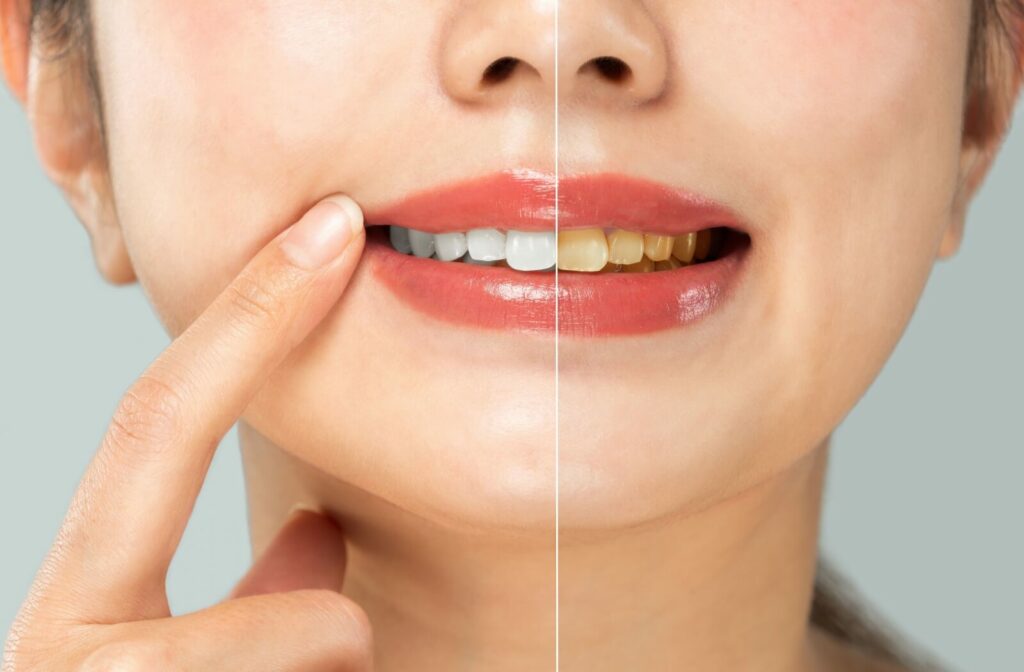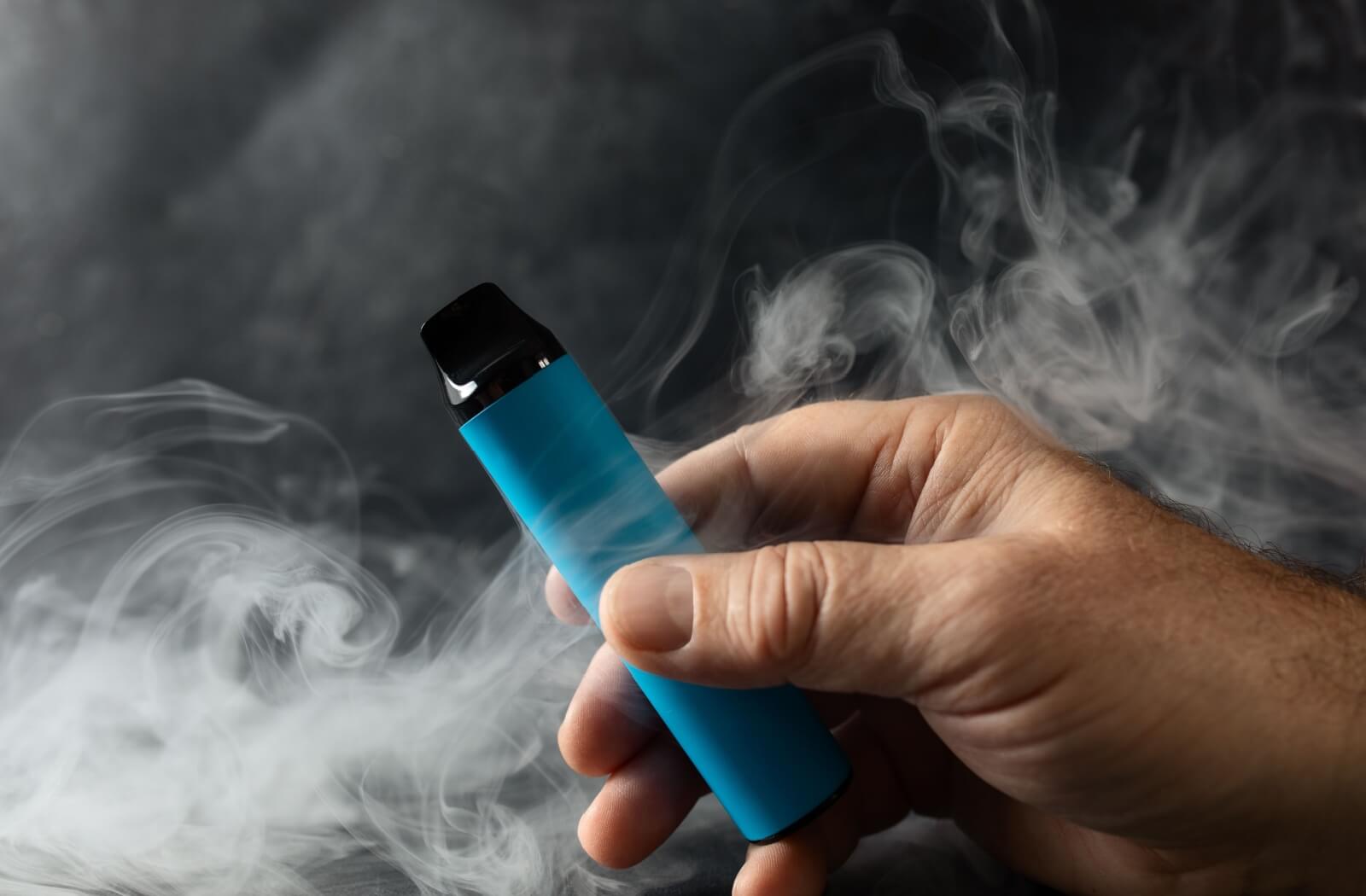While use of traditional cigarettes has declined somewhat in recent years, vaping and e-cigarette devices have, in turn, become increasingly popular. The relative newness of vaping means that many people still aren’t sure what sorts of health effects the habit may have. Can vaping cause gum disease? Can it turn your teeth yellow?
Although the negative effects of vaping are generally less severe than the effects of smoking cigarettes, vaping can, in fact, lead to yellow teeth. Perhaps more importantly, vaping can harm your dental health in a variety of ways—from making you susceptible to cavities to increasing your risk of gum disease.
Yellow teeth can be fixed with teeth whitening, but other dental health conditions may require more serious interventions. As such, frequent vapers may wish to consider regular dental exams in order to keep on top of their increased risk of various conditions.
Vaping Can Lead to Yellow teeth
Cigarettes cause yellow teeth by coating the teeth with nicotine, tar, and ash. Vaping is “safer” in this respect, as it doesn’t produce tar and ash, but nicotine vapour is still nicotine—prolonged exposure can still lead to yellow teeth.
However, yellow teeth are only one negative side effect of vaping. Other, more serious dental conditions are also made more likely by the habit.

Other Effects of Vaping on Dental Health
While vaping may be “safer” than smoking traditional cigarettes, it causes many of the same issues, ranging from more to less serious conditions. We’ll discuss a few of these issues in turn.
Vaping Causes Cavities
Two ingredients in vapes increase your likelihood of developing cavities. First, sweet-flavoured vapes generally contain sugar. Constant exposure to sugary vapour has a similar cavity-causing effect as high-sugar candy and acidic drinks.
Second, propylene glycol—a major ingredient in vaping liquid—has been shown to increase the degree to which bacteria and sugar stick to the teeth, accelerating cavity formation.
Vaping Results in Dry Mouth and Excess Mouth Bacteria
Certain ingredients in vaping liquids, especially propylene glycol, have been shown to cause dry mouth. Dry mouth is an uncomfortable condition that results in several negative effects:
- Bad breath
- Sores in the mouth
- Tooth decay
At least one study has also shown that vaping aerosols increase the amount of bacteria present on the teeth. This may be part of the reason why vaping increases your chances of cavities.
Vaping Increases Your Risk of Gum Disease
Perhap the most serious effect of vaping on a person’s dental health is the increased likelihood of developing gum disease or periodontitis. Vaping has been shown to increase the buildup of plaque and decrease bone mass in the mouth, and also decreases blood flow to the gums and harms the tissues connecting your teeth to your jaw.
Vaping Also Has Other Health Effects
In addition to harming your dental health, vaping has also been shown to hurt your general health. Some of these health effects include:
- Nicotine addiction: Most vaping liquids include nicotine, the addictive properties of which have been well-documented.
- Increased risk of lung disease: Certain additives in vaping liquids, especially those used for flavoured fluids, have been associated with lung disease.
- Increased risk of cancer: Vapes contain many of the same cancer-causing chemicals as traditional cigarettes.
How to Limit the Negative Effects of Vaping
While it’s fairly clear that vaping isn’t a healthy habit, there are steps that you can take to limit vaping’s various adverse effects. Some of these steps include:
- Know the contents of your vaping fluid. By choosing vaping fluids with less harmful ingredients, you expose yourself to fewer dangerous chemicals.
- Avoid fluids with flavours. As discussed above, flavoured vaping fluids are more likely to contain harmful chemicals.
- Limit nicotine consumption. Most (but not all) vapes contain some amount of nicotine, so switching to nicotine-free vapes can reduce the yellowing of your teeth and limit your exposure to an addictive substance. If you’re vaping as part of a plan to stop smoking, gradually tapering down the amount of nicotine you consume might also be a wise idea.
- Brush your teeth after vaping. Removing sugars and chemicals from the enamel of your teeth will limit the buildup of harmful bacteria and reduce your chances of developing cavities.
Take Care of Your Teeth
While vaping can, indeed, lead to yellow teeth—and while it can also cause other dental conditions like gum disease and cavities—there are steps that you can take to limit these adverse effects.
Even so, however, those who regularly vape are putting their dental health at elevated risk. As such, frequent vapers may wish to visit the dentist more often in order to get their teeth and gums checked out. The Canadian Dental Association suggests a baseline for dental checkups of once every six months, with more or less frequent visits recommended based on a person’s oral health.
At Ti Dental, our concern is making you comfortable with your smile, and we’re committed to helping you get the advice or assistance that you need. If you have more questions about the effects of vaping on your teeth, general concerns about your oral health, or just want to book an appointment, please don’t hesitate to contact us today.








